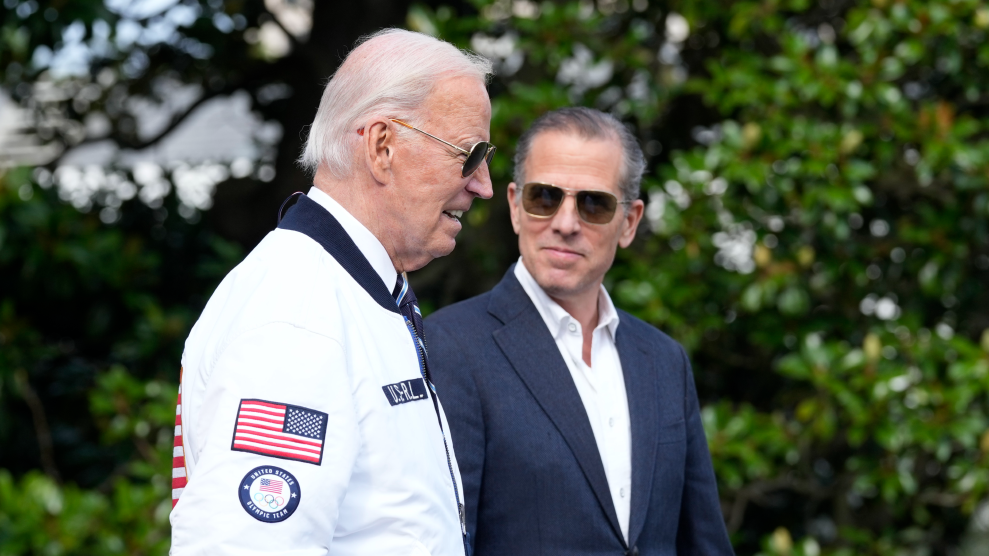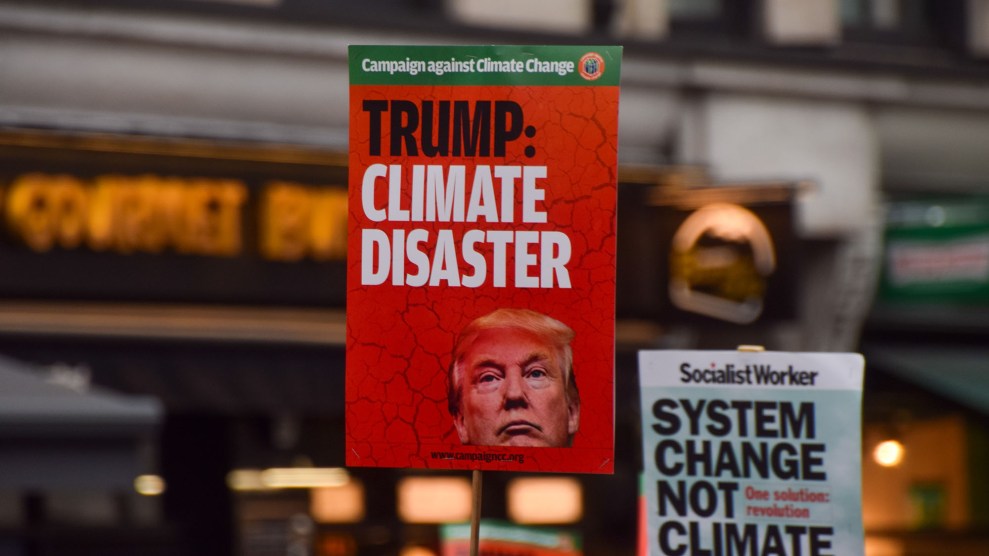
White House/ZUMA
By now, anyone who follows presidential politics has an opinion on what President Joe Biden should do following his debate meltdown that raised questions, concerns, and fears about his mental acuity. So far, a small number of Democrats have urged him to withdraw from the 2024 race. A larger number of pundits have done the same. Major funders are fretting. And the White House and his campaign have insisted Biden is up to the job and can carry on. On social media, his diehard supporters have raged against the commentariat and the apostate Democrats, asserting that Donald Trump, his lies and multiple liabilities, and the threat he poses to American democracy ought to be more the focus than Biden’s age.
No surprise, there’s no consensus in the Democratic world.
After speaking with numerous people within the Democratic cosmos, I have thoughts about this mess and possible steps forward. And I’m immodest enough to believe they might be worth sharing.
Let’s look at this as a decision tree. The first branch: What does Biden’s debate debacle mean? Many of his supporters and his own team have dismissed it as merely one bad night, with some pointing toward President Barack Obama’s disastrous first debate with Mitt Romney. But Obama’s poor performance was due to his lack of preparation and his arrogant decision to not approach Romney as a worthy adversary. It said nothing about his abilities or health.
Biden’s debate prompted the question: Was this an one-off (due to a cold, fatigue from grueling travel, or whatever) or an indication of a worrisome condition that could—or probably would—manifest itself again. If the latter, this meant his reelection bid—and the effort to prevent Trump from returning to the White House—was in great danger. One more public appearance like this one would likely end Biden’s campaign. And if such an event occurred after the convention, the Democrats would be dead ducks. Burdened with a candidate seen as in severe cognitive decline, the party could take a wallop that would include losing the Senate and failing to retake the House. The authoritarian-minded Trump would rule again, with a Republican-controlled Congress.
So here is the first decision. If you’re in the one-bad-night camp and still ridin’ with Biden, your calculating is done. You’re going to have to white-knuckle your way through the next four months.
If you believe the debate revealed a potentially existential threat for the Biden effort, then you move on to other branches on the decision tree. The next question is, if not Biden, whom?
Before proceeding, let’s note that under Democratic rules, there is no way for the party at this point to deny Biden its presidential nomination. He holds a majority of delegates to next month’s convention in Chicago, and they are pledged to vote for him. For anything else to happen, Biden would have to withdraw from the race. If he sticks with it, the rest of this what-iffing is irrelevant.
As of now, it appears pressure from Democrats on Biden to ride off into the sunset is slowly building. There could come a time when a consensus does form among the Democratic Establishment (which doesn’t really exist as an organized entity) that Biden is toast. How this position is presented to Biden could affect his decision. One obvious path is to shower Biden with love: You’ve had a wildly consequential and successful presidency, having passed tremendous pieces of legislation and having steered the nation out of a horrific pandemic. We can celebrate that at the convention. You saved us from Trump once by beating him. Now you can save us again from Trump by stepping aside. And, alas, if you continue as the nominee and lose, that will overshadow the wonderful legacy you have built.
For this exercise, let’s assume that Biden ousts himself. We’re back to what—or who—is next. The question then is: Does he anoint his successor and call on his delegates to vote for this person, or does he leave it up to the delegates at the convention to select someone else?
If Biden wants to be the decider, he has no choice other than Vice President Kamala Harris. To throw her to the curb would create a serious rift in the party, alienating a loyal voting bloc: Black Americans, in particular Black women. The cleanest scenario would be for him to announce his withdrawal and simultaneously call on the delegates to back Harris.
If Biden doesn’t do this, there will finally be what political journalists and junkies have long yearned for: an open convention. That means anyone could enter the race and compete for the nomination. Potential candidates include Govs. Gavin Newsom (California), Gretchen Whitmer (Michigan), J.B. Pritzker (Illinois), and others, as well as Harris. The convention could be conflict-ridden and chaotic. The party would indeed be in a degree of disarray. And if there is discord outside the convention hall due to protests over the Gaza war, the impression conveyed to the American public could be Democrats-equal-disorder.
So which is better for the Democrats: a quick shift to Harris or a drawn-out fight among several or many candidates that could split the party? And, once again, if Harris loses this battle, a large segment of Democratic voters could be mightily pissed off.
What if you prefer the open-convention scenario? The result could well be a nominee who has never run a national campaign and who has not yet built a national apparatus for a presidential run. And this person, largely unknown to voters (especially the low-information and less-engaged voters who will likely decide this race), would immediately confront hundreds of millions of dollars in negative ads as part of a smear campaign designed to define him or her in the worst way imaginable. This would be the Mother of All Swift-boating. Moreover, anyone but Harris would not be able to inherit the campaign war chest amassed by the Biden campaign. (Money from the Biden campaign probably can be transferred to a super PAC to support a new non-Harris candidate, but that could lead to a clunky operation.) This new candidate would have only about 10 weeks to pull it all together.
Compare this to the Harris-anointed scenario. There would more likely be smooth-sailing at the convention—at least, inside the hall. No Democrats-in-Disarray narrative. There could be a true celebration of what Biden and Harris have accomplished in their first term and excitement about her vice presidential pick. (One out-of-the-park option could be Kentucky Gov. Andy Beshear.) And she’d have all that money.
At this decision branch—Harris or a free-for-all—a big factor is this: Can Harris be an effective candidate and beat Trump? Sure, subbing her in for Biden might be the easiest course of action, but does that boost the party’s chances or not?
Harris has been an erratic politician. She had bright moments as a senator and as a candidate in the 2020 race (including when she schooled Biden on racism). But her presidential endeavor floundered. As vice president, she has often been seen as a non-entity, perhaps because the Biden team kept her reined in or assigned her impossible missions, such as resolving the border crisis. But in the wake of the Dobbs decision ending a woman’s right to an abortion, she has been a fierce and vigorous campaigner on that issue, which is an animating element of this election. She’s younger than Biden (59) and more vibrant. She has been a prosecutor and could well skewer Trump in a debate and elsewhere. And she has already taken plenty of incoming from the MAGA attack machine. She’s been fully vetted; she’s no newbie.
Back to the decision tree: a known quantity or a convention brawl that produces who-knows?
With Harris, alas, an ugly question arises: Can a Black women win enough of the key swing states that will determine the outcome: Pennsylvania, Michigan, Wisconsin, Nevada, Arizona, and Georgia? For many people, the answer will depend on their view of human nature and the power of racism and sexism. The polls show that overall Harris is as competitive—or close to—as Biden in a match-up against Trump. But that could easily shift one way or the other. If she campaigns fiercely, her numbers might go up. If the right-wing noise machine finds effective lines of attack (racist, sexist, or otherwise), her standing could slide.
If you care what I think, at this point, I lean toward Harris as providing the Democrats their best shot rather than a turbulent tournament at the convention that churns out an untested candidate. Others might favor the way of chaos, hoping it produces the contender they prefer or another nominee with a different set of liabilities than Harris.
It’s important to keep in mind that every path available to the Democrats now carries a fair amount of risk. What’s the risk of Biden zombie-ing out again? What’s the risk of Harris campaigning poorly? What’s the risk of a helter-skelter convention that turns into an internal civil war? And what’s the risk associated with whoever emerges from that tumult? No route will be risk-free.
Having decided in favor of Harris over a let’s-nominate-anyone contest, I move toward assessing the risks of the first two of those options. They are of different natures. The risk with Biden is akin to that of a titanic natural disaster. If what one fears about Biden happens to occur (after the convention), then all is lost for the Democrats. Game over. (Technically, the Democratic Party might be able to replace him following the convention, but there are plenty of logistical hurdles to that.)
With Harris, the risks are more conventional. They are related to her talents as a politician and her ability to win over voters in those crucial states. These are matters that can be addressed—though certainly there’s no guarantee they can be surmounted.
At the bottom of this decision tree, we are left with two alternatives, each presenting these different risks. A Biden who is one bad moment away from a total campaign crash, or a Harris who has a set of ordinary flaws and who would have to overcome powerful forces of racism and sexism.
The Democrats do not have an easy way out of this situation that Biden and his crew have created. He has presented his party with one helluva dilemma. And, ultimately, he may resolve to stay on the horse and afford his party no agency regarding this critical decision.
Whatever happens, there is no perfect or even close-to-perfect avenue for the Democrats. It ends up being a question of which risk you want to live with: Biden further showing decline; Harris poorly campaigning; or the convention becoming a circus that spits out a not-well-known candidate with his or her own faults. For me, on this particular day, the Harris option seems the better risk for Democrats to take. Still, I possibly could be talked out of it. But until Biden gives up his dream of a second term, none of these calculations matter—though considering them at this point is a good way to prepare for what might be a wild and profoundly important ride ahead.
















